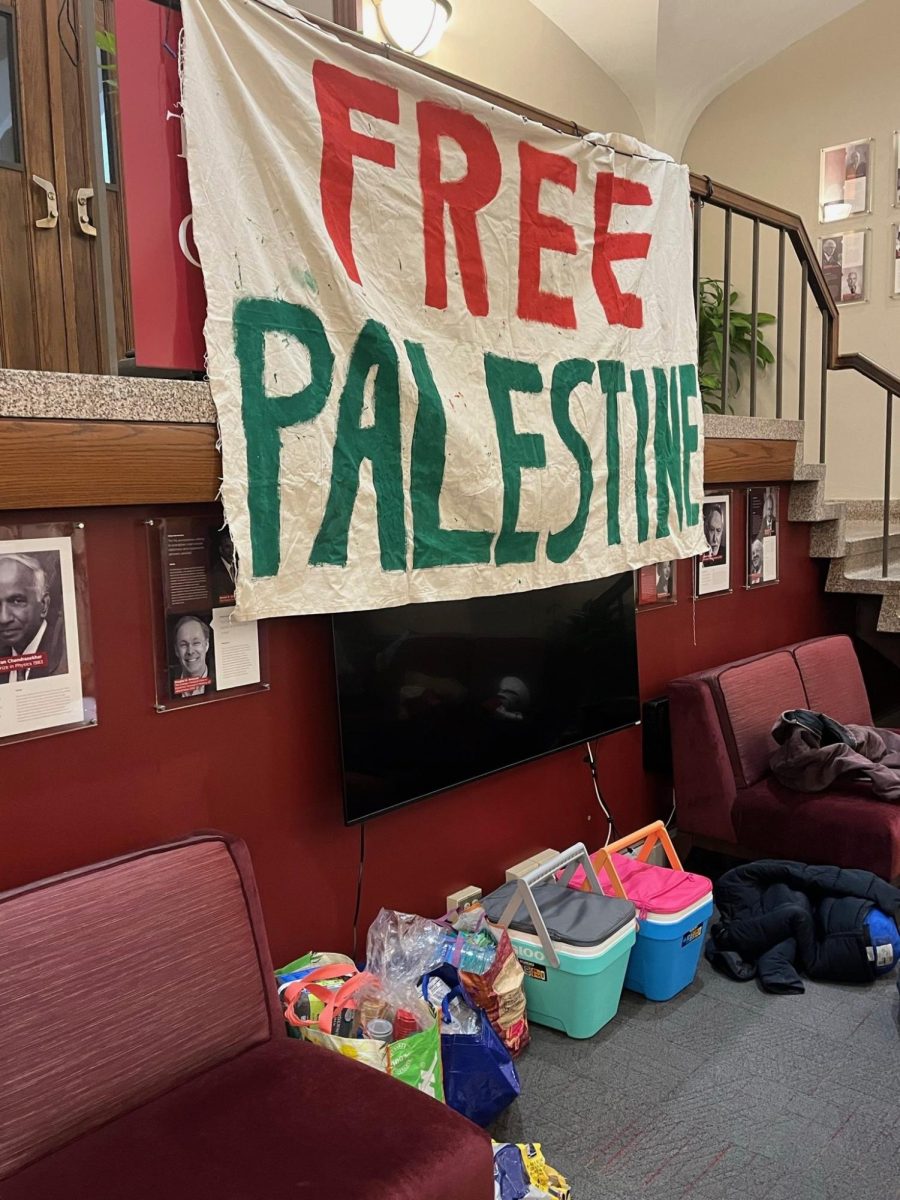We are writing as the organizing committee of the graduate employee union Graduate Students United (AFT/AAUP), which currently has over 700 members across all the divisions of the University. A small but very vocal group of administrators has recently been scheduling closed-door meetings and town halls and writing emails and op-eds to sow doubts about the benefits of graduate students unionizing. The reason why the administration is engaged in this coordinated, centralized anti-union campaign is because they are scared. They are scared for two reasons: 1) when graduate students bring our collective power to bear, we effect change; and the National Labor Relations Board may soon overturn the Brown decision from 2004, which would give private university graduate students legal collective bargaining rights; 2) graduate employee unions win better pay, benefits, and working conditions from administrations that would rather not have to fork out for them.
Consider two recently ratified contracts bargained for by graduate students, one from a private university (NYU) and one from a public university (University of Connecticut). The NYU contract, ratified in April 2015, includes a 2.25–2.5 percent yearly increase in stipends until 2019; the UConn contract, also ratified in April of 2015, includes three percent yearly stipend increases, with additional promotional increases of 5.2 percent after achieving Masters status and 11.2 percent after achieving Ph.D. candidacy. (It is worth noting here that NYU won even bigger gains in compensation with their first contract from 2002, with a 38 percent increase in the stipend minimum. Gains in first contracts are often very substantial.) In their most recent contract, NYU also won a $15 an hour minimum wage for other jobs on campus, with yearly increases up to $20 an hour in 2019. All graduate students at NYU will have dental insurance. At UConn, the childcare fund was doubled; NYU established a childcare fund, which will be increased every year, and a healthcare fund for dependents, to be increased yearly as well. Healthcare has significantly improved for graduate students at both universities. Many previously standard fees at NYU are now being waived, including any fees or tuition for any required training or coursework for appointments, including ESL language training. At UConn, the General University Fee (the equivalent of our Student Life Fee) is being progressively phased out through credits to students, to the tune of nearly $900 per year by Fall 2017.
The takeaway is simple: Just as with any other group of workers in any other sector of the economy, when graduate students organize and build collective power, forcing their institutions to listen to them, they win better wages, benefits, and working conditions. In doing so, they make their institutions more democratic, which we believe strengthens them. The University of Chicago claims to value democratic governance; they just aren’t willing to grant democratic representation to the graduate students who do so much of the teaching, research, and other work that keeps this university running every day.
The administration’s anti-union case boils down to this: “you don’t need a say in your wages, your benefits, or your working conditions because we already take such good care of you, and we really have your best interests at heart. Oh, and don’t forget you’ll have to pay dues!” They are constantly mentioning what they provide for us in terms of financial support. They fail to mention, however, that the healthcare deductible increased this year from $200 to $500 for in-network providers and from $500 to $1000 for out-of-network providers. Then there is the Student Life Fee (SLF), which has doubled since 2008, and is currently $363 per quarter, or $1,089 a year; and another $286 if students want access to student health and counseling services over the summer. And if you’re late paying your SLF? You’re fined $100—a rate of usury that the credit card companies could only dream of. They fail to mention the increasing cost of rent in Hyde Park (and Chicago generally), which has been rising by an average of around 12 percent a year in recent years, a situation that will only be exacerbated by the fact that the University has recently sold a significant percentage of its graduate student housing. This is the equivalent of our compensation decreasing by roughly $3000 annually. In addition to all of this, the University has an arbitrary cap of 19.5 hours for graduate students working other jobs on campus, and they have just recently begun including our teaching hours in this calculation (without telling us why they are doing so). This significantly hinders graduate students in their attempts to supplement an already inadequate income, especially international students who cannot work off campus.
This is why graduate student unions are important, and why collective action (with or without a union) is important. Dean Merchant (he fails to mention his administrative position as deputy dean of the Humanities) writes that “Collective action doesn’t have to happen in the context of a union. Any group of students concerned about an issue can organize an e-mail campaign, hold a teach-in, write editorials, hold a protest, or even go to the dean’s office hours, to advocate for a desired change.” We know—we’ve been doing all of these things for the last nine years, and without formal union recognition. But in the same breath he wants to say that GSU has had no effect at all, that we’re claiming as victories things that were all coming from the beneficence and hard work of administrators. (He even makes the absurd, and offensive, imputation that GSU is being sexist in claiming as victories the work of women administrators like Cathy Cohen, Deborah Nelson, and Sian Beilock. Currently, a significant part of our organizing committee is composed of women and queer-identified people, and around half of us are people of color—we’ll compare those numbers with the administration’s any day. And, unlike the administration, our organizing committee is open to anyone.) “It does a great disservice,” Merchant writes, contradicting past public statements, “to the hard work of the faculty and staff women and men who actually conceived of and implemented these changes, including making difficult budget choices to pay for them, for the GSU to claim that it was somehow involved. It wasn’t.” Well, let’s look at the history.
In 2008 the University accepted the recommendations of a Graduate Teaching Committee, raising wages for TAs, lecturers, and other graduate student teachers. The committee was formed as a result of grad student organizing (prompted by the initial exclusion of then-current students from the Graduate Aid Initiative) and included GSU members. The committee’s recommendations followed a series of direct actions by GSU related to inadequate funding and teaching pay.
In 2010 the University instituted a freeze on increases in Advanced Residency (AR) tuition. This came after a year and a half of direct action by GSU on the issue, which has advocated for the abolition of AR tuition altogether, and the recommendations of the Advanced Residency and Time to Degree Committee composed of faculty and students.
In 2013 the University initiated need-based childcare grants for graduate students. This followed a series of direct actions by GSU in a more than two-year campaign for affordable childcare. (Note that we acknowledged the work of administrators Lizanne Phalen, Brooke Noonan, Beth Niestat, and Deborah Nelson.) The University consistently acknowledges their consultation with the Student Parent Group without acknowledging the fact that it is led by GSU members who openly identified themselves as working with GSU throughout their communications with administrators. GSU also worked closely with student parents to get lactation spaces on campus.
In December 2015, the University announced raises in teaching wages and in stipends. This followed after a series of direct actions by GSU on rising fees, healthcare costs, work hour limitations, and inadequate compensation. Through a year and a half of townhalls, rallies, and at several meetings with various administrators, GSU members consistently emphasized our inadequate wages and the rising costs of graduate life. It also followed after the overwhelming vote by the non-tenure track faculty to unionize with the Service Employees International Union.
Merchant says: “These claims are not accurate, and in part confuse temporal coincidence with causality and advocacy with agency.” But given the fact that these changes have always followed after the direct action campaigns of GSU, it’s a pretty safe bet to assume that there is a causal relationship. And often, the administration is claiming complete credit for actions that were taken in direct consultation with GSU members and other students.
The administration is putting out boilerplate anti-union rhetoric. We know that the major anti-union law firm Cozen O’Connor (the same firm hired by Northwestern University to fight the efforts of their football team to form a union) is on the University payroll. How much are they being paid and for what? Until they prove otherwise by being transparent and disclosing documents, we assume that the anti-union rhetoric being peddled by the administration is coming from this outside, third-party law firm. They claim to be neutral on the issue of unionization and to be committed to “rigorous dialogue” about it. This stance of neutrality and commitment to open dialogue is belied by the fact that they have refused a request to post GSU’s FAQ next to their own on the University website, and also refused a request to inform graduate students whether or not Cozen O’Connor was involved in writing the administration’s FAQ. Their strategy is to pose as the neutral arbiters of information, while sowing doubts.
To be clear, our struggle is with the administration, not with faculty, a great number of which support our right to unionize. The faculty’s advocacy chapter of the American Association of University Professors published a letter in February in support of GSU, which currently has well over 100 signatures. Another piece of the administration’s boilerplate rhetoric is to say that unionizing will hurt relationships with faculty. But empirical studies have consistently shown this to be false.
The simple truth here is that unless we fight the administration on the issues that concern us, and force them to listen to us, they will try to preserve the status quo. The University is in a budget and credit crisis, and is responding in the standard fashion: a regime of austerity that squeezes employees at the bottom, including graduate employees. The question of unionization is in actuality quite simple: do we want to unite together to force the administration to listen to us and to bargain with us about the issues that concern us as employees of this institution and members of this community? For GSU, the answer is also quite simple: yes. That is why we have been engaged in collective action for the last nine years, and why we will continue to be in the future. Cui bono? To the benefit of us all, not just the benefit of a few administrators (they’re doing just fine). As Frederick Douglass said: “Power concedes nothing without a demand; it never has and it never will.”
—The Organizing Committee of Graduate Students United







